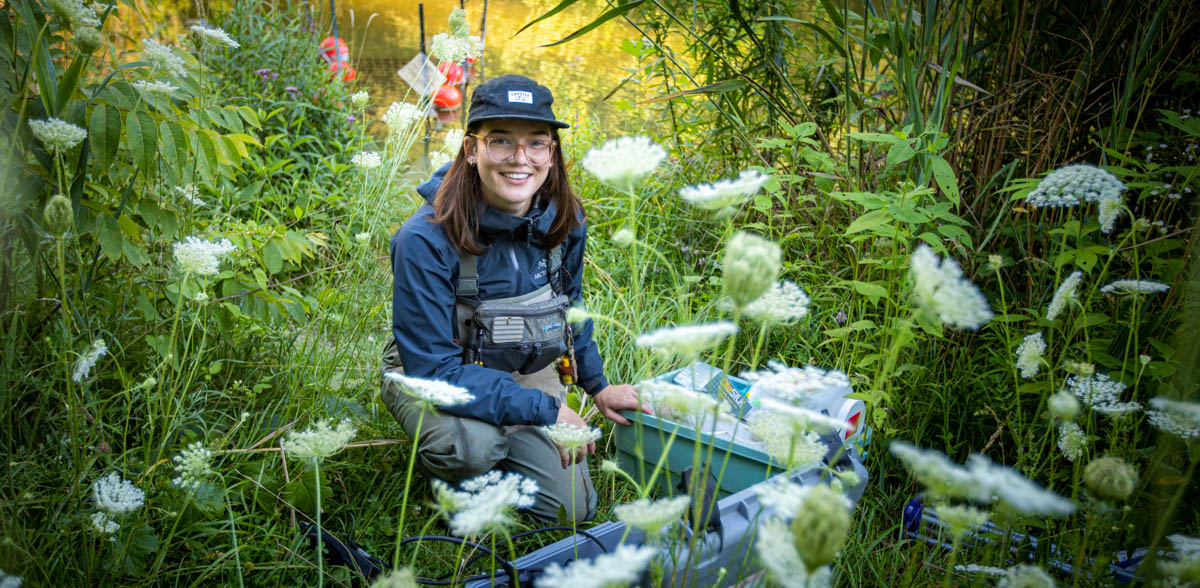Moira Ijzerman

Programs
Environmental Sciences + Toxicology
Why did you choose the University of Guelph?
I decided to pursue graduate studies at the University of Guelph because of the fantastic environmental toxicology program and I wanted to do research under my two advisors (Dr. Ryan Prosser and Dr. Paul Sibley). I study aquatic toxicology, which is a big focus for my two research advisors so I was very excited to work with them. It also helps that Guelph is a great city to live in, and the campus has a lot of resources available to support students.
A bit about your path...
I completed my BSc in environmental science at the University of Guelph in 2019. I decided to pursue graduate research after completing my undergraduate thesis in Dr. Naresh Thevathasans' lab. My undergraduate supervisor has been a fantastic mentor, and completing an undergraduate thesis gave me a glimpse of what graduate research would be like and I was hooked! During my final two years of my undergrad, I tried to participate in as many research projects as I could to give myself a strong foundation and to help me decide what specific topics I was interested in.
A bit about the work you are doing here...
The lab I work in focuses on ecotoxicology, but I specifically am researching pesticides in rivers. I'm looking at developing a new method to monitor pesticides in rivers by using biofilms (that slippery stuff that grows on rocks in rivers!). Biofilms have the ability to concentrate pesticide residues that get washed into rivers from the surrounding agricultural fields, and they might provide a more sensitive measure than traditional monitoring techniques. Biofilms form the base of the aquatic food web, and so I am also very interested in determining if benthic invertebrates are at risk when they eat pesticide-contaminated biofilms.
My field experiments allow me to sampling different rivers across the province, which means I'm out in the field all summer and working on lab experiments during the colder months. For me, it's a perfect mix of lab and field work.
While I really enjoy working on my own research, one of my favourite parts of graduate school is helping out with my lab mates projects. Graduate school is full of people who are super passionate about their own research, and it's always a highlight to give a friend a hand on their project and learn from them!
How do you think your research can improve life?
Developing a cost-effective sampling tool can benefit Ontario's current pesticide monitoring program by providing a more sensitive measure of pesticides in aquatic environments, while simultaneously reducing monitoring costs. I am also hoping that I can improve our knowledge on whether biofilm-associated pesticides act an exposure pathway to aquatic food webs. As a result, reporting on pesticide pollutants and water quality in Southern Ontario's aquatic environments may be greatly improved.
A bit about your advisor...
I am so grateful to be supervised by two incredible advisors and I have a great relationship with them. My advisors are extremely supportive of any new ideas I choose to pursue, and encourage me to pursue hands-on opportunities to help improve my field and laboratory skills and to present my research at conferences.
What it is like to be a graduate student at UofG?
Being a graduate student at UoG has been incredibly rewarding. Every week is different! Some days I am out in the river working on the field experiments, other days I'm working alongside my lab mates in the lab designing and setting up experiments, and other days I work on writing up my results. It's really enjoyable to be involved in a project at all the different stages: coming up with the questions you want to answer, designing the experiments, data collection and of course, analyzing the results! The graduate student community at Guelph is pretty tight-knit, and it's been great to have support from your fellow students/friends during some of the more stressful times.
What you like about living in the City of Guelph?
I've lived and gone to school in Guelph for close to 6 years now. Guelph is a fantastic city to live and work in. The food is great, people are very friendly, and the city is beautiful (I have a particular soft spot for walking up and down the Speed River hiking trails). There's lot's of activities you can become involved in in Guelph.